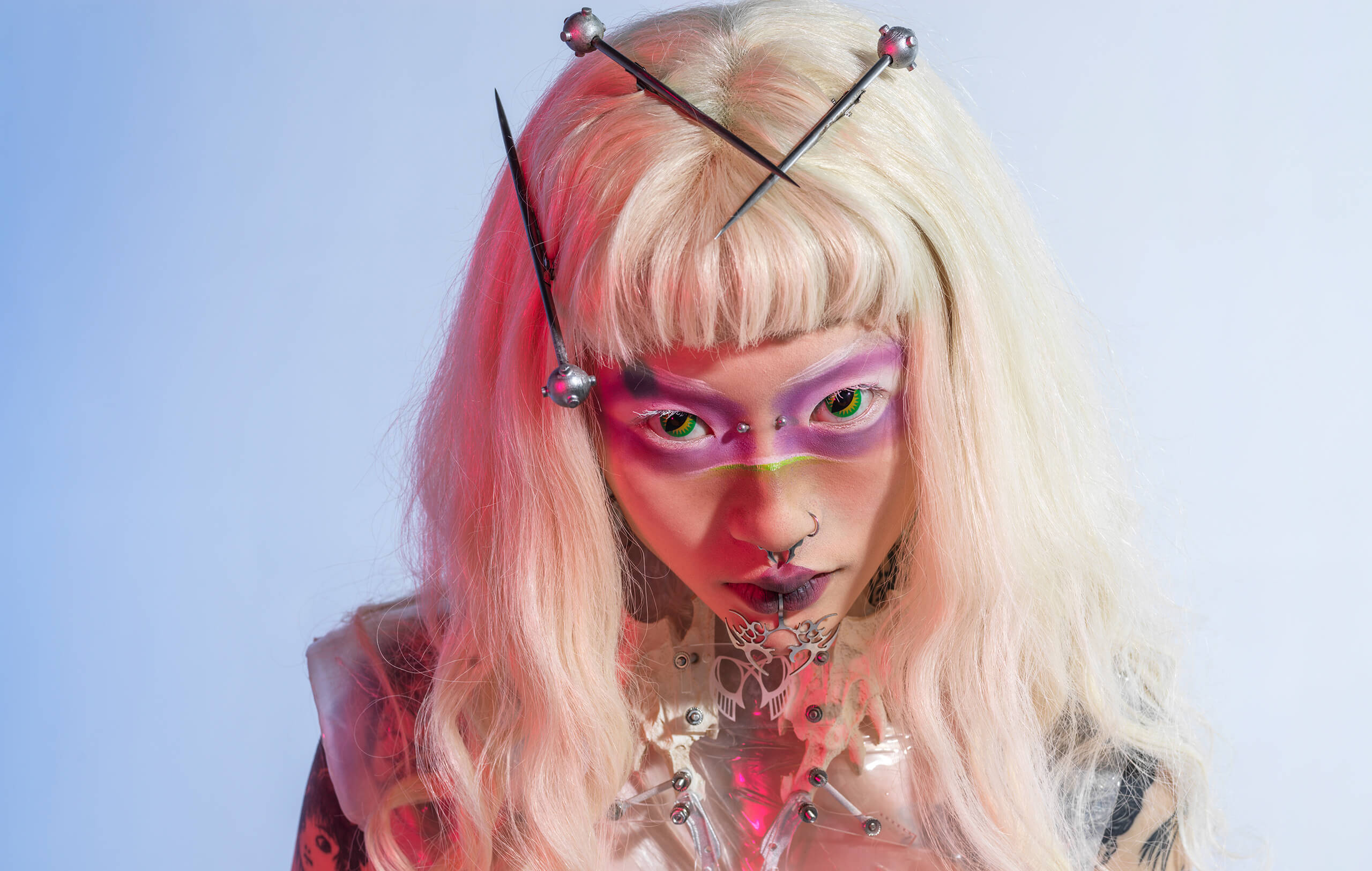
yeule: “Pop music is transmutable. Avant-garde carves and shapes how pop will evolve”
Virtual (in)sanity, cyborgian futures, and dark pop incantations with the London-based artist and producer.
Image: Perou for MusicTech
From their bedroom studio in London, yeule, the 23-year-old musician, artist, live-streamer and cyborg, is looking out at me from under a grey hoodie and filling me in on their choice of makeup for our interview.
“Today’s makeup,” they explain with a smile, “is just eyeshadow at the bottom to make it look like I have bags under my eyes. Because I want to tell the world a message: I am tired.”
And they surely have a right to be. Since 2014, London-based Singaporean Nat Ćmiel has inhabited the moniker of yeule – an enigmatic musical entity whose output currently spans everything from albums and art installations to zines and Twitch streams. Now, after nearly two challenging years in pandemic-enforced lockdown, they’re on the cusp of releasing their second full-length album: a darkly gorgeous collection of songs titled Glitch Princess.
Big things are happening. Or, as Ćmiel puts it: “You’re interviewing me at a very pivotal time in my life.”
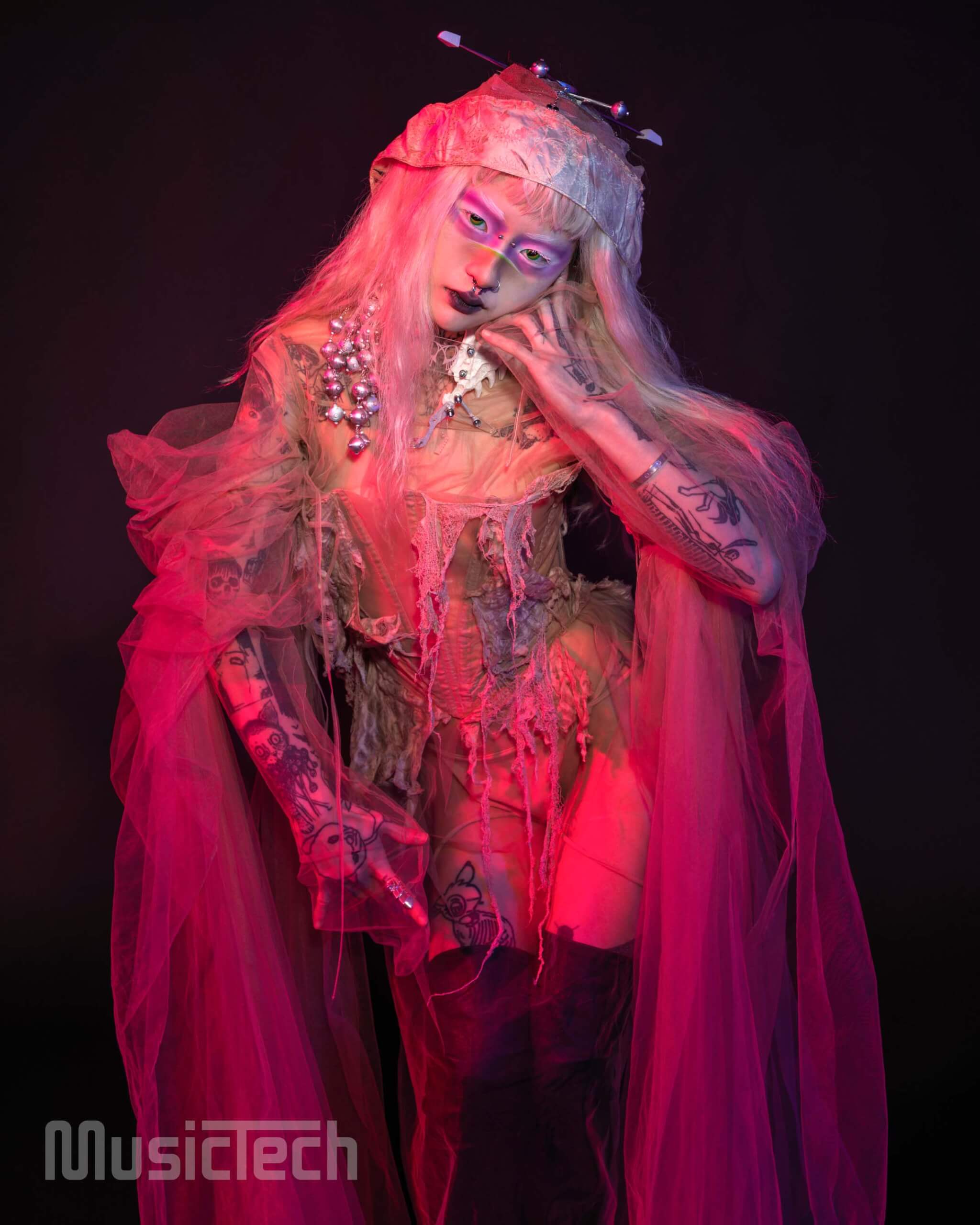
Starting with the independent release of their self-titled EP, yeule, in 2014, Ćmiel has produced a steady stream of increasingly ambitious musical projects. Characterised by dreamlike vocals and dystopian aesthetics – think Twin Peaks by way of Akira – each successive EP has seen the artist push their musical boundaries, leading up to their full-length debut in 2019, Serotonin II.
With so many musical milestones behind them, it comes as something of a surprise that Ćmiel doesn’t have a well-rehearsed answer to the question: ‘what is the Yeule project’?
Instead, the question provokes a moment of genuine consideration before a reply comes. “A physical, musical, and visual reflection based on the temporal aspect of me,” they say. “It’s documentation, really. I use it as a touchstone to relate myself back to experiences.”
“You’re interviewing me at a very pivotal time in my life”
At first, that might sound like lofty philosophical musings. But in fact, it’s a good-faith attempt at explaining a distinctly personal creative process, one that exists just as much for the benefit of Ćmiel themself, as it does as for their fans.
The name itself was originally inspired by Final Fantasy XII-2’s Nsu-Yeul, a character caught in an endless cycle of death and rebirth. It’s an apt metaphor for an artist whose work dances on a knife edge of beauty and morbidity.
Though born in Singapore, Ćmiel describes their early life as a largely nomadic experience. Without a firm sense of home or cultural belonging, they gravitated toward stories and spaces that could be carried with them or accessed from anywhere: video games, anime and online communities.
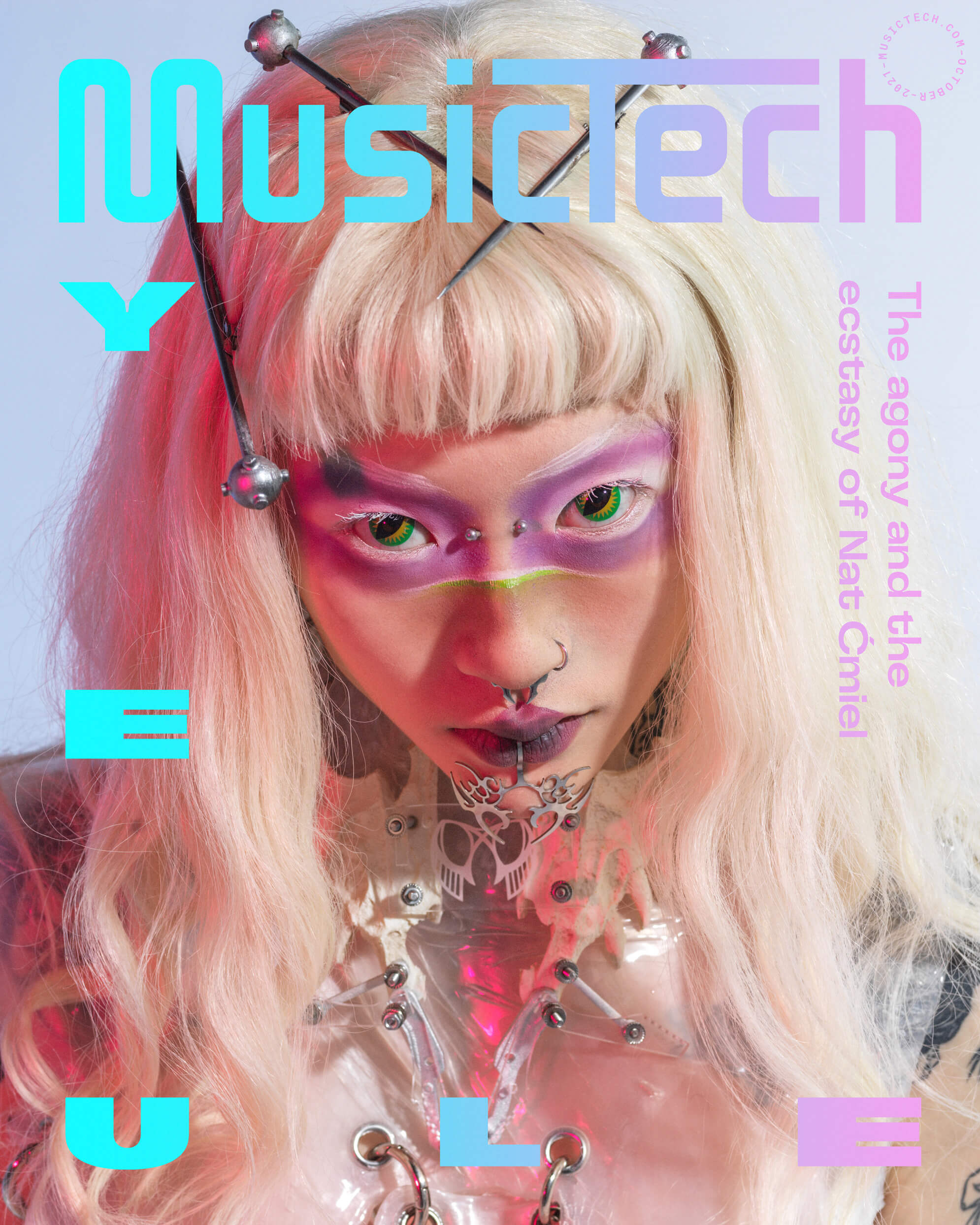
“I would meet people from Japan, or Korea, or the UK,” they recall. “They had such a firmly rooted history. I was latching on to the people I met online, seeing how they would relate themselves so heavily to their culture, when I barely had any culture to refer myself to. I was quite empty.”
It may be that that emptiness allowed Ćmiel to soak up visual and musical influences throughout their teenage years. An affinity for romantic composers such as Maurice Ravel was paired with a love of contemporary scores from game composers like Nobuo Uematsu, whose crystalline melodies for the Final Fantasy series has influenced Ćmiel’s songwriting to this day. They also cite artists as diverse as Jon Hopkins, Billie Holiday, Bjork, The Velvet Underground and A$AP Rocky as inspirations for their production style.
Not that pop is a dirty word for Ćmiel. While they say they have an “affection” for pop, it’s the evolving nature of the genre – if it can even be called that – which appeals to them. “Pop music is transmutable,” they elaborate. “It changes all the time; it shapeshifts with culture and history.
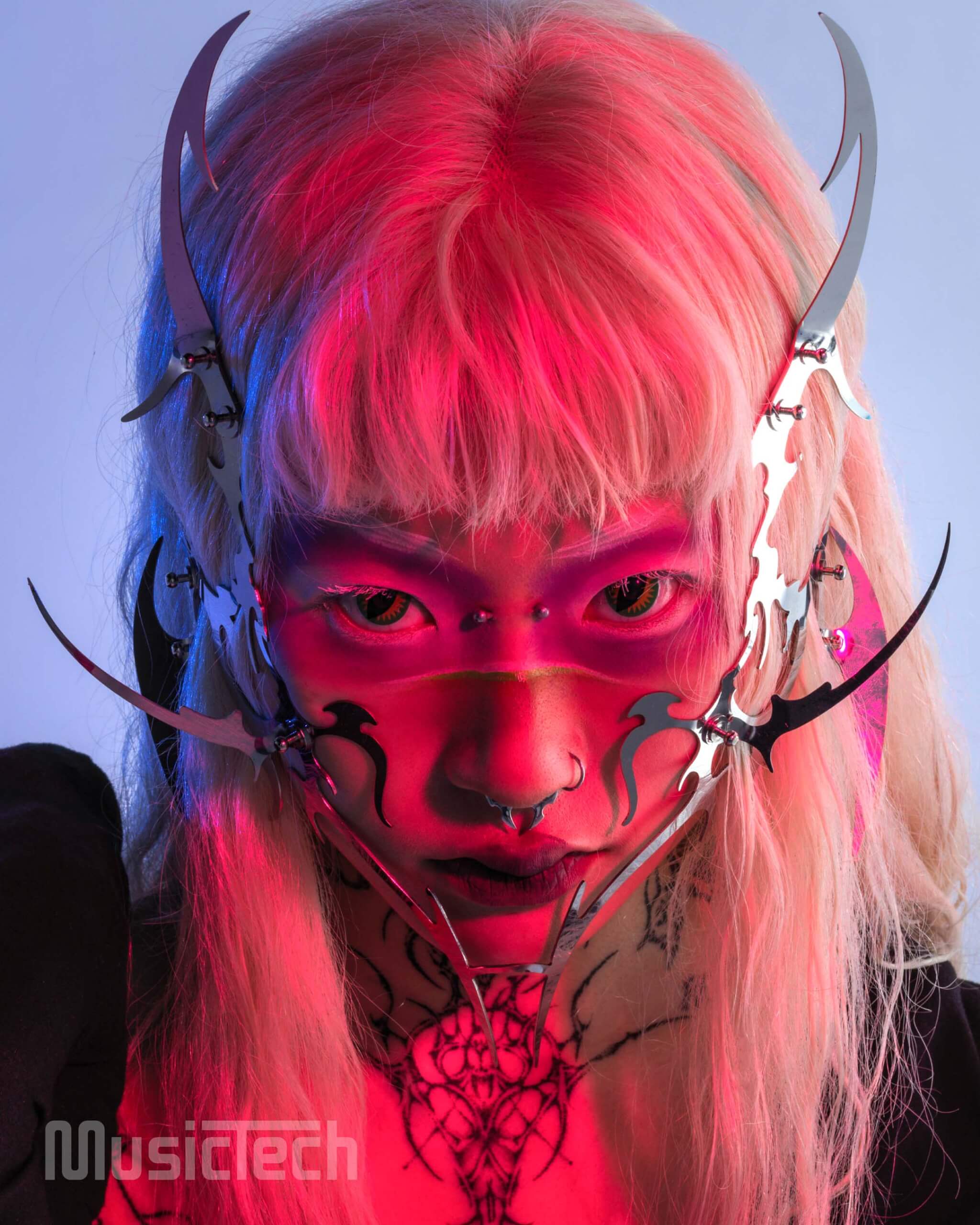
“I remember reading about Velvet Underground and how they were considered avant-garde for the time. It’s the avant-garde that carves the path forward for a lot of popular music and shapes how it will evolve.”
Similarly, their highly distinctive approach to makeup and fashion has combined everything from kawaii aesthetics and Lolita goth to cyberpunk cyborgs and alien horror. Asked about the role that makeup plays in the yeule project, Ćmiel is philosophical.
“I think I’m now OK with things I used to not have a good relationship with, like being barefaced. Now, as I’ve gotten older, I realised that [makeup] is not a mask. It’s more like ‘how am I feeling today’? It’s definitely part of the persona, but it’s also me trying to express a certain part of myself.”
“When I started calling myself a cyborg entity, I felt comfortable because then I didn’t have to try to relate to the labels put onto me”
Along with a sense of cultural disconnect, Ćmiel recalls a feeling of distance from their physical form during childhood. “When I was younger, I used to have these out of body experiences. I remember walking to school, and I would look at my feet and I just felt like I was controlling a character. I wasn’t actually in my body.”
That separation from the body became a key area of intellectual and artistic exploration when Ćmiel went on to graduate with a fine arts degree from Saint Martin’s College in London. “I was doing a lot of research on post-humanism embodiment when I was at university,” they say. “Because a lot of my work was based on technological dystopia.”
Ćmiel identifies as a non-binary cyborg entity, a concept drawn in part from the writings of feminist author Donna Haraway, whose seminal text A Cyborg Manifesto describes these entities as made up of “transgressed boundaries, potent fusions and dangerous possibilities”.
For the songwriter, identifying as a cyborg sweeps away any notions of binary gender or race, while providing a way to redefine how they inhabit their physical form. “The labels which are put on me,” begins Ćmiel. “‘Asian’, ‘young female artist’. When I started calling myself a cyborg entity, I felt comfortable because then I didn’t have to try to relate to the labels that are put onto me.
“It created this more solidified idea of my relationship with my body and perception of myself.”
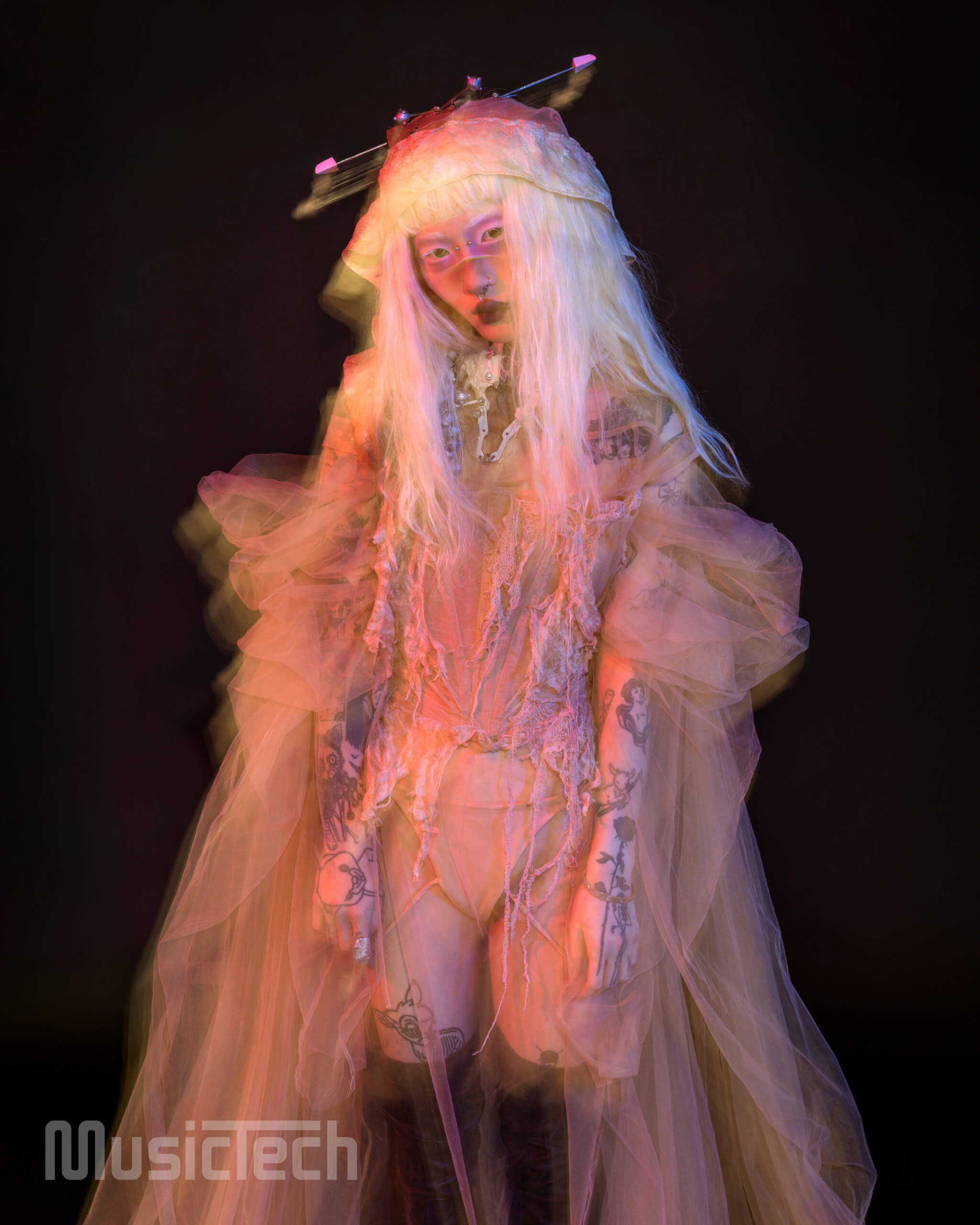
Perceptions of self, of body and of intimacy are topics that come up repeatedly in our conversation, most often in relation to digital spaces and communication networks. Though Ćmiel is a firm believer in the positive aspects of online culture, they also have no illusions about its double-edged nature – especially in the context of the enforced isolation they’ve endured since the start of the pandemic.
“I’ve taken a step back and disconnected from the internet,” says Ćmiel. “I’m trying to reset that relationship because I was very much ‘plugged in’ most of my life: hardcore gaming, hours and hours of internet browsing.”
Perhaps more so than any other artist, Ćmiel personifies the concept of ‘digital native’. And the internet is a leading character in their story – a friend, a lover, a saviour, an enemy. It’s something they’ve explored extensively through their music, particularly on the stunning Serotonin II. It’s an album that pits dream-pop vocals and minimalist synth textures against themes of longing and loneliness. On the single Pixel Affection, Ćmiel examines the search for meaningful, intimate connections within digital spaces – their potentials and their pitfalls.
“When I wrote Pixel Affection,” says Ćmiel. “It was about online intimacy and how the illusion of comfort can be shattered when you realise that it’s not as safe as you thought it was. Even though it’s an alternative to real life, it still has its dangers.”
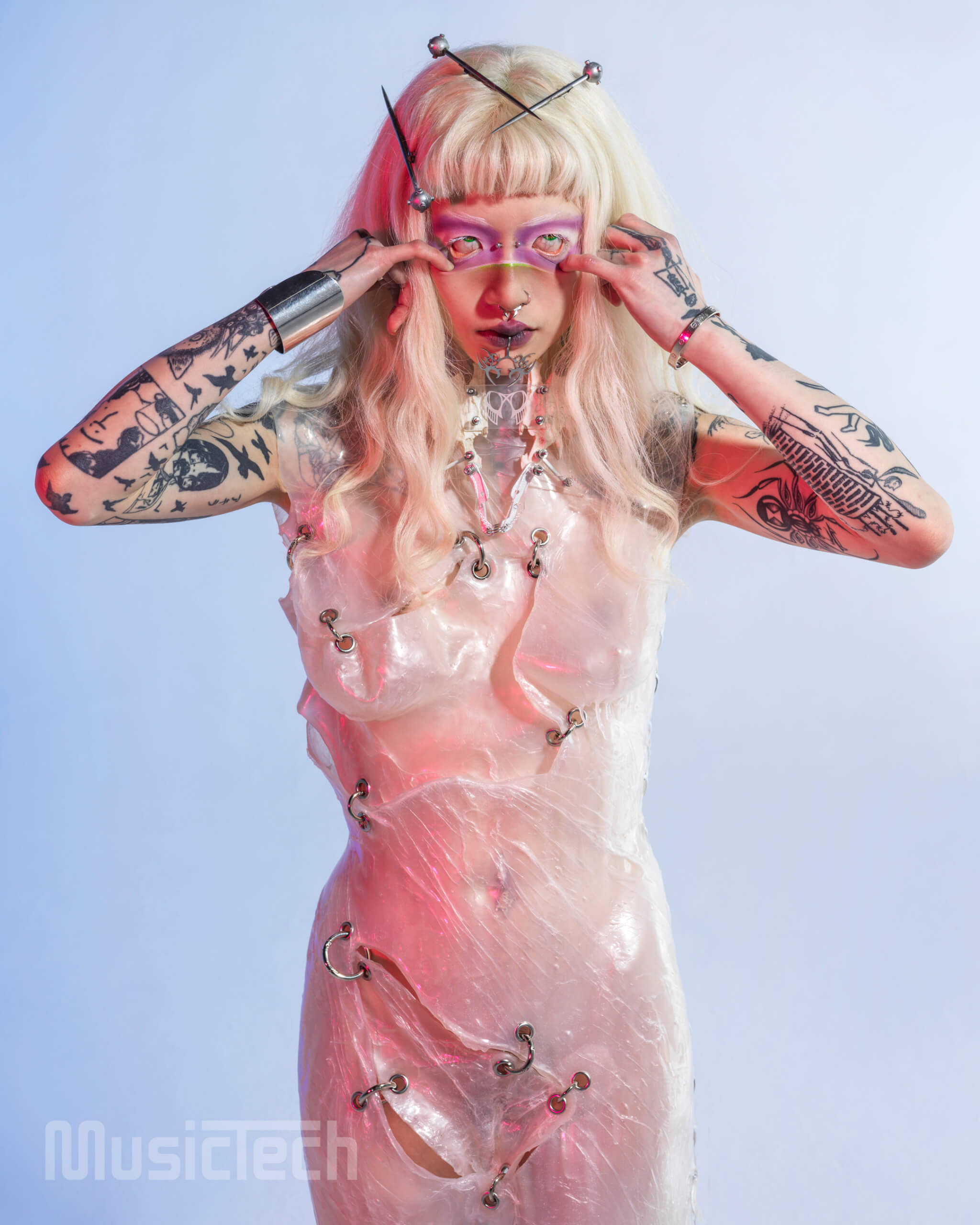
Dangerous or not, Ćmiel is an outlier in how extensively they have chosen to engage with fans on the internet. Eschewing mediated conversations and staged press events, they have instead nurtured an unfiltered following of watchers, listeners and supporters.
“I have a Discord server that I’ve built from the ground up,” they say. “It was a long, painful process, but I’m so glad I did it. I do a lot of multiplayer gaming streams, where my subscribers play Minecraft or horror games with me, which is really fun.”
That kind of unmediated contact makes perfect sense for an artist who grew up on online platforms such as Tumblr. The ability for Ćmiel and their fans to interact directly with one another has not only forged a sense of connection and community, it’s also helped mitigate some of the more toxic aspects commonly associated with online fandoms.
“I think it humanises me a little bit,” says Ćmiel. “It takes me away from being on a pedestal. I like when my fans can see that I’m also like them, that I’m also a person who goes through spurts of emotion, and anger, and rage when I can’t beat a boss in Final Fantasy 7.
“We’re doing this project for live shows to create a virtual version of me. I think it’s a really interesting idea to create an effigy of yourself”
“People fixate on online fandoms, and the culture can get very intense sometimes, but I think generally my fans are really chill. We’ve created a really, really, really safe and understanding community together.”
Though the internet has undoubtedly been a profound influence, Ćmiel is quick to point out that, somewhat paradoxically, much of their work comes from an examination of the physical – of body parts, emotions, sensations and memories.
“You can see how much of an impact [the internet] has, and even though that is a huge part of my life, I get a lot of my inspiration and influences through pure experience. It just depends on what I’m experiencing at that point in my life.”
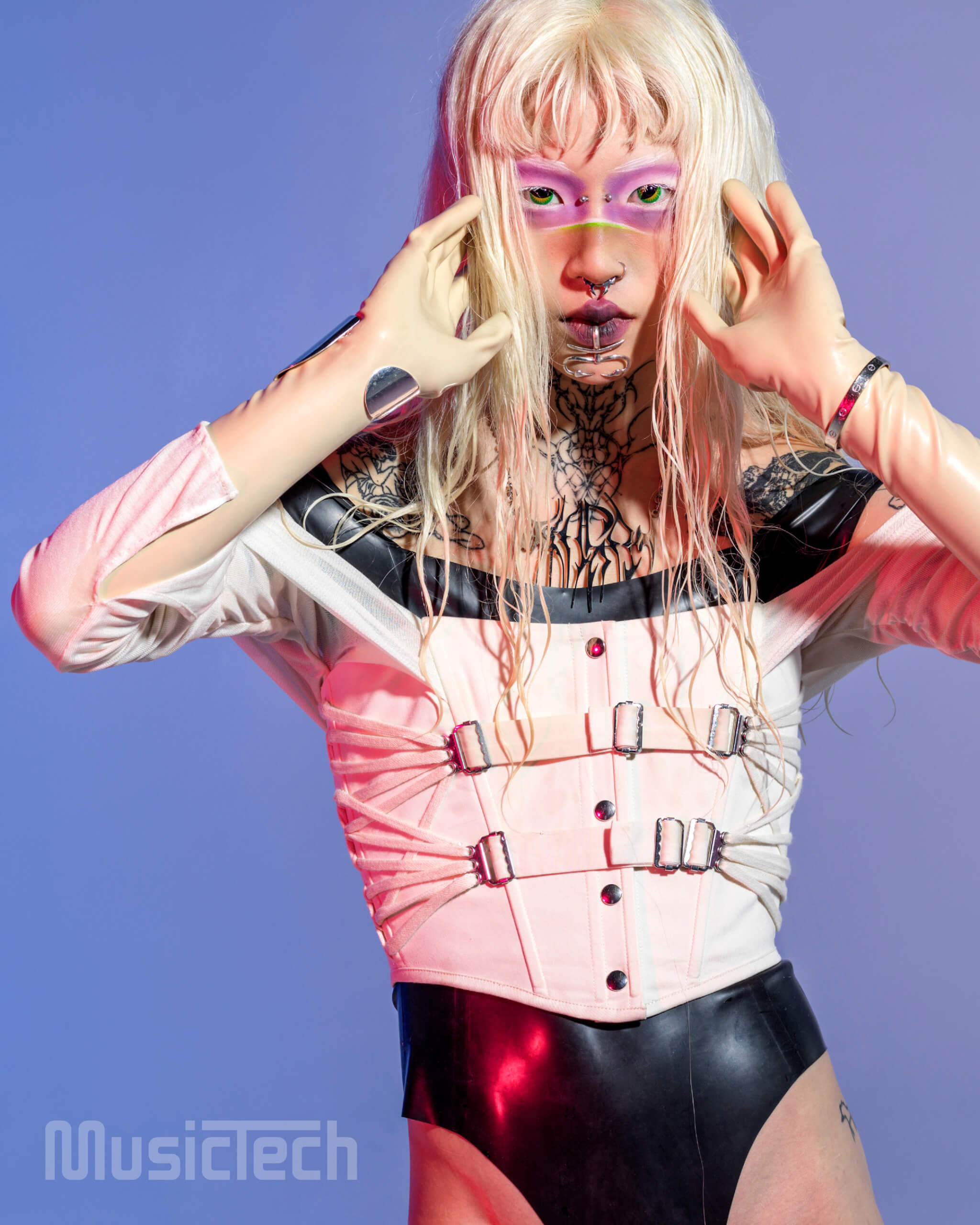
In contrast to the ethereal existentialism that permeated their previous releases, the experience of the global pandemic has lent an entirely harsher and more confronting sound to the forthcoming album, Glitch Princess. The synths are louder, the noise is noisier and the lyrics go to places that many artists would shy away from.
Self-harm is examined with an uncompromising eye as the album grapples with the emotional and mental consequences of lockdown-induced isolation and sobriety. The lyrics are starkly authentic, yet eerily objective. Ćmiel observes those darker impulses with the detached, impartial air of a documentary filmmaker.
The album title itself references the ‘glitches’ the songwriter perceives in themself – the notion coming initially from a series of computer faults – a faulty RAM, a defective hard drive, a corrupted DAW session. Ćmiel spun the metaphor around to reflect back the “inconsistencies and flaws” they perceive in themself.
“When I was writing Glitch Princess,” says Ćmiel “The pandemic was happening, and I was isolated a lot. I started going back to my hikikomori ways.” Hikikomori is a Japanese term to describe an increasingly prevalent phenomenon in the country of teenagers and young adults who withdraw from society and hole up in their bedrooms, losing themselves in games or fandoms.
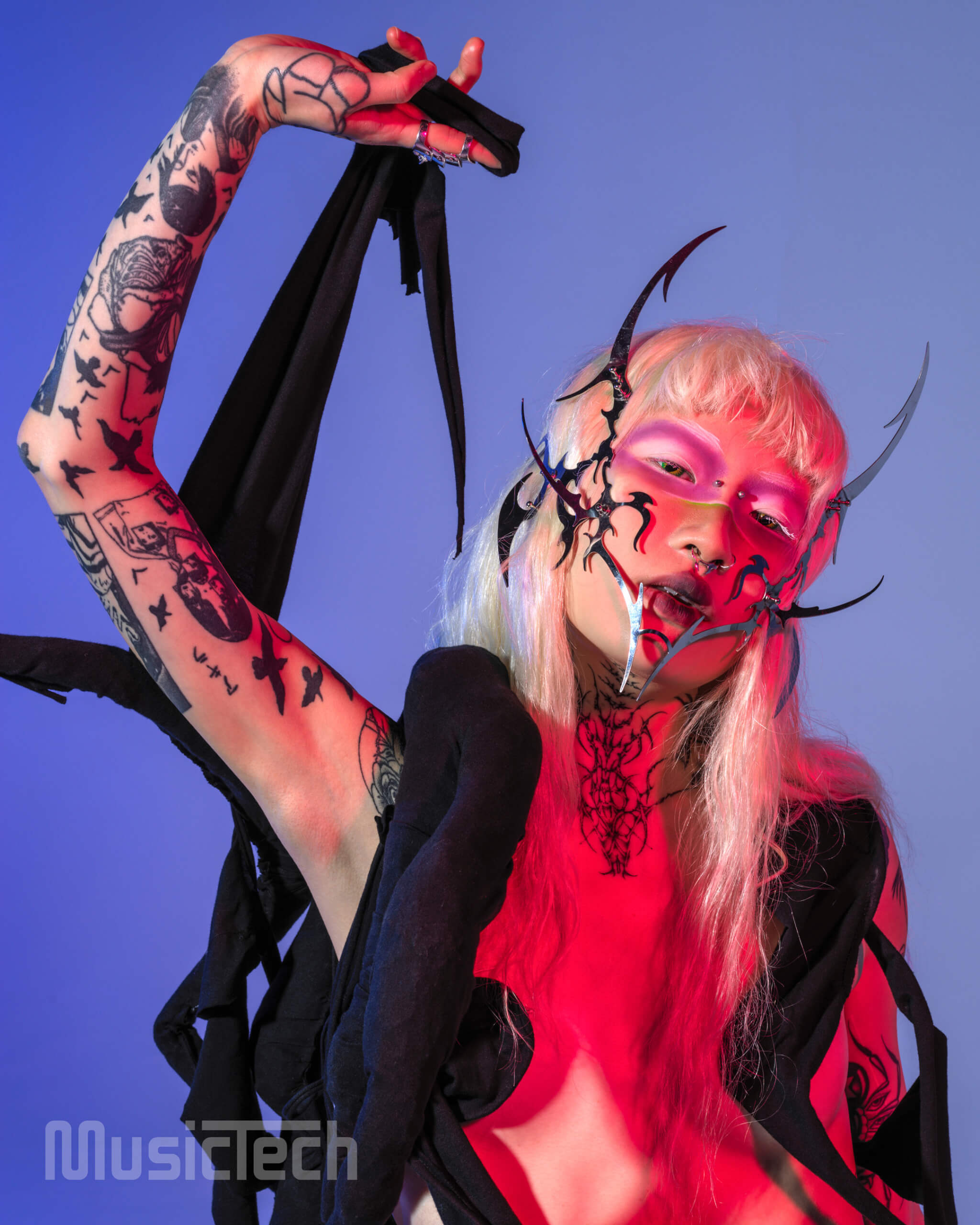
It’s an issue that the singer-songwriter has grappled with for much of their life, but one that the pandemic exacerbated. “My anxiety got so bad that I couldn’t leave, and I was just locked in, again,” they say. “I’m still actually working on that right now. It’s a bit difficult for me to even go to social events, but I’m trying my best. I need to figure out why it’s become so crystallised in my identity to be very isolated, or to prefer isolation.”
The album opens with the track I Am Nat Ćmiel, a surprise move for an artist who so frequently separates themself from their songs. It’s a surprisingly frank and unabashed look at the person behind the persona. Asked why they chose to put their real name on the opening track, Ćmiel replies with a roguish smile and a shrug. “Just being polite and introducing myself, you know?”
“I don’t like to assume how things will be. I like to contain everything in the now and experience it all, in all its different forms”
Of course, there’s more to it than that: “I was just feeling so incredibly dissociated from myself,” they say. “That I needed to go back to basics and think about what we did as kids – you know, being in class and doing writing exercises where they say ‘everyone write your name, write how old you are, where you live, where you come from’. And I was like, what if I did that now with my 22-year-old brain? How different would that sound?”
Despite the emotional gravity of the album’s conception and development, Glitch Princess represents a musical coming-of-age of sorts for yeule. They masterfully bring in in hip-hop influences on Too Dead Inside, elements of noise music on Fragments, and indie pop sensibilities on the toe-tapping single Don’t Be So Hard On Your Own Beauty.
That desire for musical growth and experimentation can also be heard on their recent collaboration with British hyperpop artist Danny L Harle, Things They Did For Me Out of Love. Clocking in at four hours and 44 minutes, the track is a slow-motion meditation punctuated by the sounds of wind, water, birds and Ćmiel’s voice recounting her dream-diary in a half-heard whisper.
“[Danny] would create these sound environments based on the dreams I had,” they recall. “I was back in Singapore, and I was really deep in the cityscape, living in a high-rise building on the 18th floor. I think I was craving a connection to nature.”
Despite the track’s glacial slowness, that desire for green spaces somehow manages to shine through. As each frozen harmony blurs into the next, the texture never settles in one spot, and a restless sense of searching permeates the listening experience.
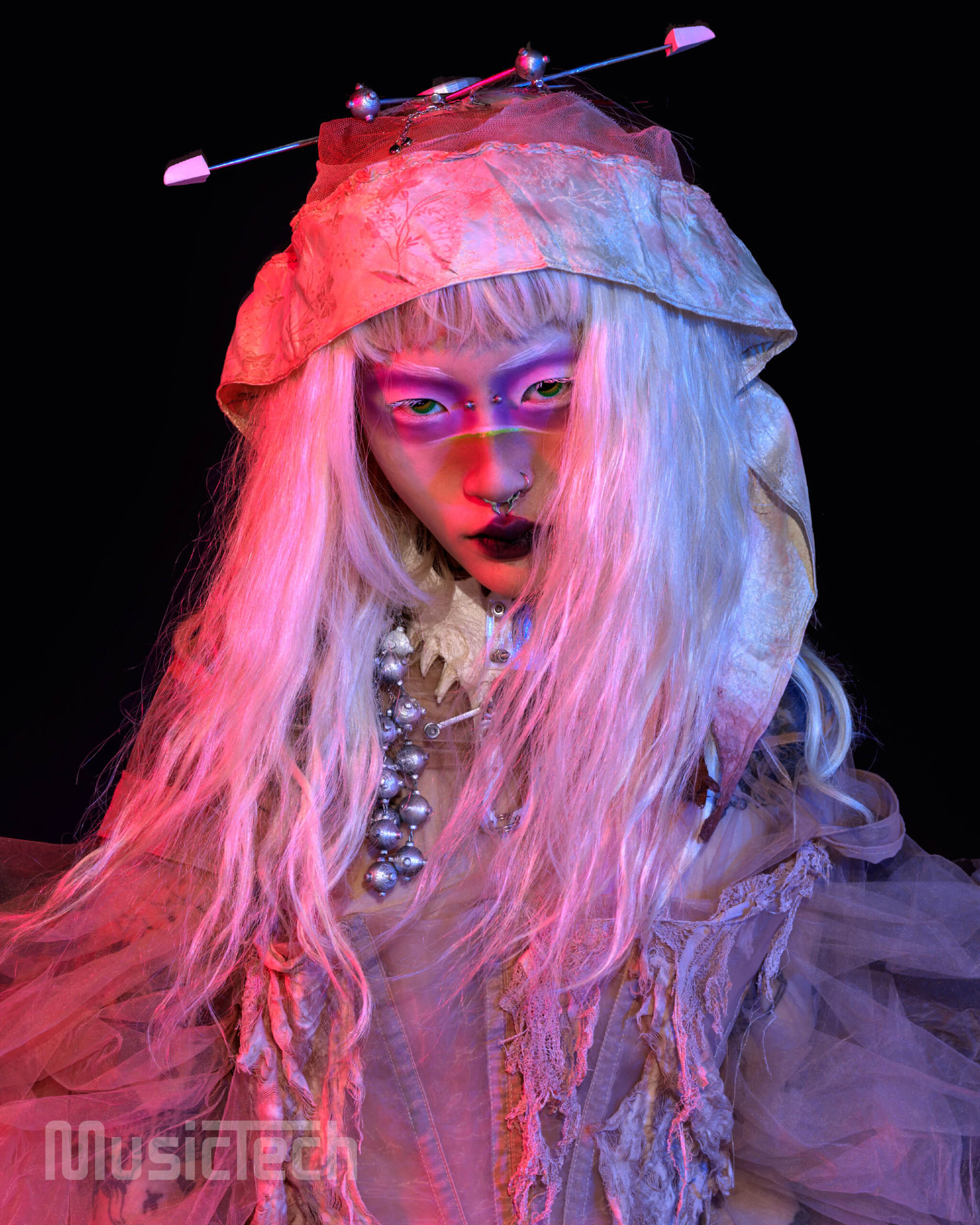
Dabbling with movie-length ambient tracks is just one of the new avenues that Ćmiel is looking at for the yeule project. As would seem only logical, the artist is exploring possible integrations of VR and AR into their performances – though the details are still to be unveiled.
“Everyone will find out sooner or later,” they say with a conspiratorial air. “But we’re doing this long-term project for the yeule live shows to create a fully virtual version of me, so that I no longer have to do shows in physical form.”
Does that mean Ćmiel is intending to give up performing altogether? Luckily not. This as-yet-unnamed VR/AR project will translate the yeule project into the digital realm while still leaving room for the cyborg entity to make an appearance in the flesh, as it were.
“I will still be present,” Ćmiel assures me. “But I think it’s a really interesting idea to create an effigy of yourself.”
While the yeule project may serve as a touchstone for Ćmiel’s past and as a glimpse into their possible future, they make it clear that it’s the here and now that interests them more. The sounds and sensations of the present are there to be recombined, personified and embodied.
“We only ever exist in the present,” says Ćmiel. “Whatever we imagined the past was, or the future will be, it’s always still inside of our head. So I don’t really like to assume how things will be. I like to contain everything in the now and experience it all, in all its different forms.”
Glitch Princess is out 4 February 2022.